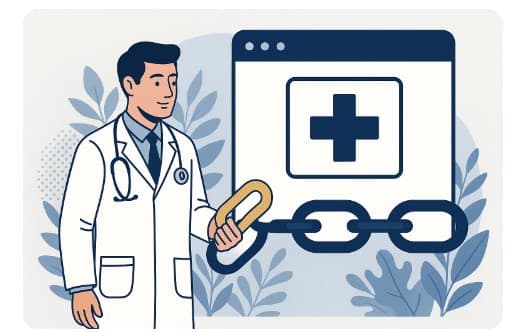People searching for health information online need more than answers. They are looking for certainty.
The decision to choose a medical provider or trust health advice carries real weight, a reality that search engines recognize. Google categorizes healthcare content under “Your Money or Your Life” (YMYL), applying stricter scrutiny to ensure results come from authoritative and trustworthy sources.
Success in this space depends on building a foundation of genuine credibility. For healthcare providers, navigating this complex landscape often requires a specialized approach. Something a dedicated backlink service like Linkbuilding.services is built to handle, focusing on strategies that prioritize credibility above all else.
Why Healthcare Link Building is a Different Beast
Healthcare exists in a separate SEO universe where standard rules do not apply. The entire framework is governed by E-E-A-T: Experience, Expertise, Authoritativeness, and Trustworthiness. Google’s MEDIC update cemented this principle, mandating that health content must be created or validated by qualified professionals.
This elevated standard makes the consequences of poor link building far more severe.
A low-quality link pointing to an online store might be an insignificant flaw. For a healthcare provider, that same link becomes a critical liability. It can trigger algorithmic penalties that drastically reduce visibility.
More importantly, it actively undermines the digital trust that patients and search engines require. In this field, each link must function as a verified credential, directly contributing to a reputation for reliability.
Actionable Strategies for Healthcare Websites
Focus on becoming a primary source of information rather than just seeking links.
Your most valuable asset is the data only you possess. Transform your patient outcomes data into compelling original studies. Analyze local health patterns that only your practice can document. Package these insights into professional whitepapers that academic institutions and government health agencies would cite. When a university public health department links to your research, you receive a digital seal of approval that Google recognizes as the highest form of endorsement.
Establish your physicians as contributors to medical discourse beyond your website.
Target publications where medical professionals actually read and share information. Contribute to journals from the American Medical Association or specialty associations relevant to your practice.
When cardiologists see your surgeon’s byline in a respected cardiology journal, they’re more likely to reference that content—and link to it from their own educational resources. This creates referral patterns that both humans and algorithms recognize as genuine professional recognition.
Forge connections that matter in your physical community.
Instead of generic sponsorships, create genuine partnerships with local organizations. Collaborate with the YMCA on a heart health initiative or partner with senior centers on fall prevention workshops.
These authentic relationships often result in natural links from municipal websites, community health networks, and local news coverage that Google values for local search relevance. These aren’t just links—they’re digital evidence of your practice’s community integration.
Prepare your specialists for media opportunities by developing their unique perspectives on healthcare topics.
Monitor services like HARO for reporters working on stories where your neurologist’s experience with migraine treatments or your orthopedic surgeon’s approach to sports injuries would provide valuable insight.
When The Washington Post quotes your expert and links to your practice, you’re gaining a third-party validation that money can’t buy.
Create patient resources so comprehensive they become the definitive guide on a topic.
Develop treatment explanations that actually answer patient questions rather than just targeting keywords. When your explanation of “what to expect after knee replacement surgery” becomes more helpful than hospital resources, physical therapists will link to it. Medical schools will reference it.
Even competitors might eventually cite it because it genuinely helps patients. This creates an ecosystem of natural links that signal to Google you’re a true resource for the healthcare community.
Essential Pitfalls to Avoid
The path to building a healthy backlink profile is filled with potential missteps that can severely damage a healthcare site’s standing.

One common error involves listings in irrelevant or low-quality online directories. While legitimate medical-specific directories can be beneficial, being listed in spammy or unrelated general directories appears manipulative to search engines and can dilute your site’s topical authority, leading to ranking drops.
The most catastrophic risk for any healthcare website is using black-hat SEO techniques.
Google’s algorithms are specifically designed to detect and penalize artificial link schemes. For a YMYL site, the penalty can result in a manual action that removes the site from search results entirely. We’re talking about obliterating organic visibility and destroying patient trust that took years to build. The recovery process is long, difficult, and never guaranteed.
Another technical but critical mistake is using over-optimized anchor text.
If an unnatural number of links to your site all use the exact same commercial keyword phrase (e.g., “best cardiologist in Houston”), it triggers a red flag for search engines. This pattern looks artificial and manipulative. A natural profile uses a diverse mix of anchor text, including brand names, URLs, and generic phrases like “learn more.” Maintaining this diversity is key to appearing organic and avoiding algorithmic filters.
Tracking Performance: Beyond the Basics
Focus on what drives your practice forward. Vanity numbers like DA offer little real-world value for a healthcare provider. Your analysis should center on concrete outcomes that reflect genuine patient engagement and practice growth.
Monitor visitor behavior on key service pages.
A surge in organic traffic to pages detailing specific treatments or procedures signals effective targeting. This indicates that your content is successfully reaching individuals actively seeking your expertise.
Observe search visibility for precise medical terms.
Improvements in rankings for phrases like “cardiac rehabilitation program” or “minimally invasive spine surgery” demonstrate rising authority. This enhanced visibility positions your practice as a top resource for specific health concerns.
The ultimate measure of success is new patient acquisition.
Implement systems to track inquiries that originate from organic search. Note how many potential patients mention finding you through Google or directly reference your online resources. This data provides the clearest connection between your SEO strategy and practice growth, offering undeniable proof of your efforts’ return on investment.
Conclusion: Building a Foundation of Credibility
The most effective healthcare websites become essential resources. Patients turn to them for reliable information. Journalists seek them out for expert commentary.
This level of authority emerges when your digital presence accurately reflects your clinical expertise. Each quality backlink serves as a professional endorsement from the medical community.
Shift your focus to earning references.
Create original research. Develop genuinely useful patient materials. Establish meaningful partnerships. Quality links will follow naturally as a byproduct of your expertise.
This approach requires patience.
Meaningful results typically appear within six to twelve months. However, this foundation proves resilient against algorithm updates. True success is measured not in link counts, but in patient trust. That trust transforms information seekers into loyal patients.
